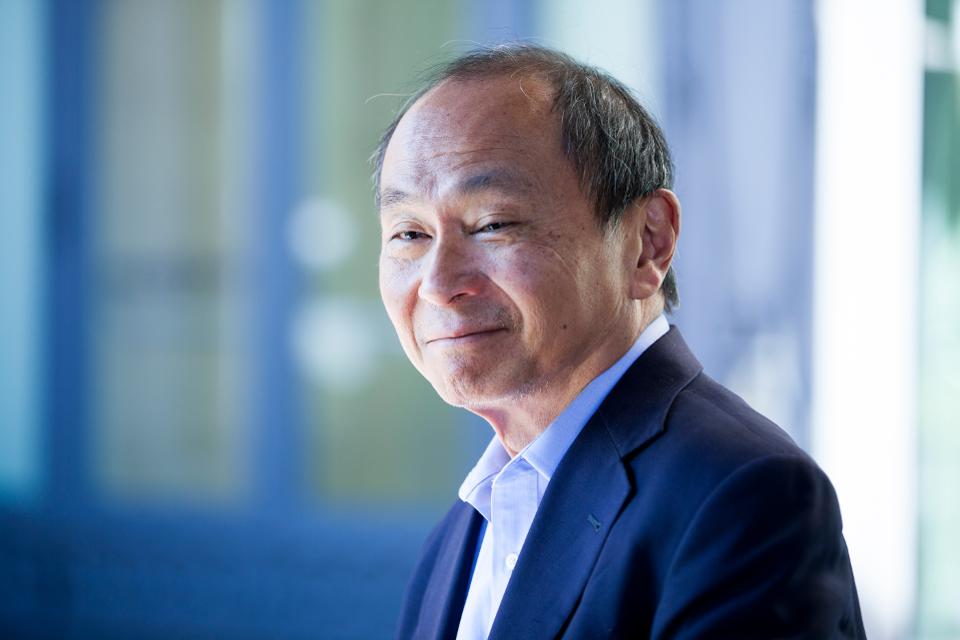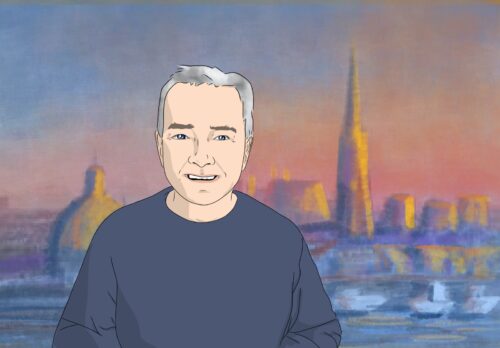Francis Fukuyama: COVID-19 is threatening global democracy and peace

“It’s not the case that democracies can’t handle this sort of thing, it’s just American democracy at this particular moment is very troubled.”

What is the key that determines a country’s resistance to the coronavirus? Francis Fukuyama, the renowned American political scientist and author of The End of History, argues that the answer is not regime type, but rather whether citizens trust their leaders, and whether those leaders preside over a competent and effective state.
In a recent interview, Fukuyama, who lives in California, the first U.S. state to issue a stay-at-home order, discussed the performance of democracies and authoritarian countries during the COVID-19 outbreak, as well as the implications of this crisis for the world order.
We’ve divided the interview into four sections:
“There is probably going to be a permanent change, because people are seeing they can actually do things in a different way.”
“I think if we had a different president, we wouldn’t be in the same situation…(Until Trump is gone), I’m afraid we are stuck in this situation.”
“Many people in the West really don’t understand Chinese history and the deep cultural traditions that exist in China.”
“I worry both about global democracy and peace because we may be losing both of them.”
On the new normal
Question: Things have come to a halt at Stanford and you have been recording videos and teaching online. What’s your daily life like during this difficult time? How are you coping with this new normal that is affecting everybody?
Fukuyama: I’m actually just as busy as I was before this shutdown happened, except that I just go from one online meeting to another. It’s hard to keep track what day of the week it is because every day seems the same as the day before.
It’s not been that bad, because actually teaching is one of the things that, it turns out, isn’t hard to do online, and it’s been interesting trying to adapt to it. I’ve been working and trying to move my teaching materials to an online format anyhow, and this has been a good excuse to try it out.
A lot of people say they feel the boundary between work and life has been blurred. Do you feel that way?
Sure. I think also there is probably going to be a permanent change, because people are seeing they can actually do things in a different way. For example, I was constantly on airplanes in my previous life, and I haven’t flown since early March now, and I think one thing people may realize is, it’s really not necessary to spend all that time on airplanes. We can actually accomplish the same things over the internet. So we’ll have to see how things go back to normal. I suspect they never will.
The pandemic is expected to drive CO2 emissions down 6% this year, in what would be the biggest yearly drop since World War II. Is that a silver lining — combating climate change — as people don’t have so many carbon footprints?
Yes, but that’s really an unsustainable situation. Unfortunately, carbon emissions are pretty closely related to economic activities. So if you stop producing things, you lower your carbon, but you also get a lot poorer. So I’m not sure that’s a good solution in the long run.
On the U.S.
“The problem is that our political alignments have become cultural sources of identity. And so, for people who like Donald Trump, downplaying the epidemic and showing that you’re not scared of the virus has become the mark that you are part of this team.”
![]()
Audrey Jiajia Li: In your recent article (published in the Atlantic), you mention that the crucial determinant in performance will not be regime type, but the state’s capacity and, above all, trust in government. As for the U.S., you said while it may be slow to act at first, once it is up to speed, it can match the capabilities of most authoritarian governments, including China’s. But can we say we are still not there yet?
Fukuyama: I said two things. You need basic state capacity, and democracies are not necessarily worse. But the other problem is that you also need trust in government, and right now that’s something we really don’t have because of this high degree of political polarization in the United States. So there have been a lot of protests by red-state citizens and politicians against the shutdowns because, unfortunately, that issue becomes polarized.
This is just one of the unfortunate political conditions of the United States at the moment. I think if we had a different president, we wouldn’t be in the same situation. I think Trump may be gone by November, then we can get back to a more normal kind of leader, but until that happens, I’m afraid we are stuck in this situation.
So you think the president should bear the most responsibility?
Yes, I think as the leader, he did have a big responsibility to step up to this task. And this is one of the problems with electing somebody with as little background and knowledge as our president has. But it’s also rooted in this division that exists in American society, which existed before Trump was elected and unfortunately will probably continue after it. I think it’s really the biggest weakness of the United States right now.
You think this pandemic could cost Trump’s reelection?
I think that there’s a lot of little signs that this is really not good for him. His main argument for being reelected was the booming economy, and now we’re heading into one of the deepest recessions, depressions we’ve experienced in our lifetime. But more importantly, his performance in this crisis has been so awful that I think people want somebody competent as president, and that’s really going to hurt him very much.
What about the balance between government power and individual freedom? Quarantine is obviously a restriction of individual freedom, and we are seeing people protesting the stay-at-home order in the name of protecting freedom. What’s your take on introducing government power aimed at protecting everyone from the virus, while such measures of ordered isolation are indeed placing limits on people’s freedom?
The reason that people are protesting is not because they think that some important freedom is being challenged. One of the protesters was complaining he couldn’t get a haircut. No serious person would say that the freedom to get a haircut is more important than keeping your fellow citizens alive. That’s just a ridiculous position. But the problem is that our political alignments have become cultural sources of identity. And so, for people who like Donald Trump, downplaying the epidemic and showing that you’re not scared of the virus has become the mark that you are part of this team, you are part of a tribe that doesn’t believe in the seriousness of the disease. And even if it’s not rational, it’s not based on any kind of scientific evidence, this desire to be part of the team is so strong that it overwhelms people’s reason. We’ve seen cases of things like this before, but unfortunately it’s happening right now in the middle of an epidemic.
Do you think the government’s inadequate actions may be the result of the society’s overemphasis on individual freedom?
I’m not sure this is the case. If you look at prior emergencies, when the United States was fighting two world wars, or even the situation after 9/11, you had a lot of national unity and people weren’t complaining about the loss of freedom when faced with an outside threat. Right now, this is the situation that’s very unique to the particular environment that has emerged. And I think that’s something that’s very important to emphasize to Chinese readers, that I don’t think the American response tells you anything about democracy as a general system of government.
“I don’t think the American response tells you anything about democracy as a general system of government.”
For example, if you look at South Korea, the South Korean government took the crisis seriously, they began preparing for it all the way in January before there were any cases in South Korea. They started creating tests that became widely available. They have a healthcare system and made treatment for the virus free to all of their citizens. And they delegated the authority for managing the system to a public health expert: She was a permanent civil servant who had a very good background in this kind of issue. And as a result, they have done much better than China has in terms of controlling the disease, and they are a democracy. In fact, they managed to hold a major national election right in the middle of this global crisis, and they did it successfully. So I think it’s not the case that democracies can’t handle this sort of thing, it’s just American democracy at this particular moment is very troubled. [The handling of the virus] reflects deep divisions within society.
But except for South Korea, most of the democracies in the world haven’t done a good enough job so far, so some people are arguing that this miserable situation is the price of freedom in democracies. In other words, we should not blame the government, as the power of government is limited in the first place?
I don’t think you can possibly make the case that authoritarian governments are doing better as a whole. You have a couple of cases — there’s China and there’s Singapore — that managed to get on top of this crisis through authoritarian methods. But there are many other authoritarian countries that are doing a terrible job, and they’ve been afflicted. Russia is a good example: viruses really have gotten out of control in Russia. And in Belarus you have a president that was arguing that the virus wasn’t a threat and could be defeated by drinking a lot of vodka. And in Turkmenistan, you weren’t even allowed to use the word coronavirus, or the government would arrest you. So it’s not the case that in general authoritarian governments are responding well.
But the issue is not whether democracies or authoritarian [do better], it’s really whether you have good state capacity and whether the government really has the trust of its citizens. And that can happen in a democracy or it can happen in certain authoritarian states.
What’s your take on the possible shift in the balance of power between the federal government and state governments in the aftermath of this crisis, in light of the recent debate over who has the power to “reopen” the economy, and with the White House holding briefings daily while state authorities have been doing most of the frontline work?
I think that in this situation, where you have a not-very-competent federal government, it’s actually really very good to have the system of federalism, because the individual states don’t have to wait for the federal government to take action — and that’s really what’s happened in places like California and New York and Illinois and so forth.
The other thing, in the United States, there really is a big difference in the way that the virus has spread: it hit crowded cities first, New York especially, but also Detroit and New Orleans — but there are plenty of rural states where it hasn’t been that big of a crisis and therefore those governors have taken a more relaxed attitude. Now it may turn out that that’s a really big mistake because eventually the virus is gonna get everywhere and they may actually pay a higher price for having waited.
But you know, the United States is a really diverse country, it’s got a lot of different regions and cultures and so forth, so I think in general our system of federalism is important for allowing local adjustments to conditions.
Speaking of the level of trust placed on the capability of a nation’s leadership, which you argue is an important factor deciding success or failure in this fight: As you noticed, both the U.S. and China’s top-level leadership downplayed the seriousness of the problem initially. In a case like that, has trust in the capability of the leadership contributed to the worsening of the problem?
So, trust by itself is not necessarily a good thing if you trust somebody that’s incompetent or doesn’t know what they’re doing or has bad intentions. Then you’re actually going to make the situation worse. The proper forms of trust are built on actual confidence that you know that whoever is running the government knows what they’re doing — it has to be built on expertise, on education, on the ability to actually accomplish things. And if you have that kind of government, then people are going to trust.
Again, I just turn to the example of South Korea, because they delegated responsibility for handling the epidemic to some serious experts in public health. The levels of trust in the South Korean government have gone way up, and that’s part of the reason that the ruling party won the election, because people saw that they were very competent and they reward them for it.
But isn’t that the “rally around the flag” phenomenon? Even Trump’s approval rating once hit a record high, 49%, right?
That was about a month ago, since then it’s dropped back down. It’s somewhere in the lower 40s again. I think there was a short-term boost that many leaders get when you’re first confronted with a big crisis, but I think, going on, people realize that he really doesn’t know what he’s doing. The thing is that other leaders, when they got this kind of “rally around the flag” phenomenon, saw their popularity go up to 60, 70, 80 percent. This happened to [Emmanuel] Macron in France and other people, but Trump’s never got over 50 percent and it fell back very quickly, so I think that he really didn’t benefit very much from this.
On China
“There’s no country that is simply on the side of individualism or collectivism. All political systems have to be able to act collectively when it’s necessary, and they have to respect individual preferences when they can.”
![]()
Li: You mentioned in your recent interview that the China model is the most successful one among the non-Western models, which is a combination of state interference and capitalism, as at least it cares about providing help to people. In your opinion, can China’s experience be of some help to the rest of the world, and if so, in what way?
Fukuyama: I don’t think China’s model can be very easily exported to other countries that don’t have China’s cultural traditions. The oldest traditions in China have to do with meritocracy with education, with a bureaucracy that is chosen on the basis of merit, and it’s a very self-disciplined form of government, which the Communist Party has one version of. And I think that it’s extremely difficult to set up that kind of model in countries that don’t have the Confucian traditions that China does. If you take it to Latin America or to sub-Saharan Africa, where there’s really no state tradition that’s anywhere comparable to China’s, it just becomes an excuse for a kind of unpleasant, ineffective authoritarian government.
If you look at parts of the world that this kind of authoritarian model has worked relatively well, at least in producing economic growth, almost all of them are in East Asia. South Korea under dictatorship, Taiwan under the Kuomintang in the early days, and Singapore — places that are in the cultural sphere of Chinese influence — I think share this kind of tradition of bureaucracy and centralized government, and that’s why they’ve been able to do relatively well.
So maybe that’s why South Korea is different from the Western democracies in terms of battling the virus — it’s an East Asian country and they have this Confucianism.
That’s true. But you know, if you look at Germany’s performance, or several of the Scandinavian countries — Denmark and Norway and so forth — they’ve also done very well in this crisis because this tradition of bureaucratic government is not unique to China. There are other Western countries that have a strong bureaucratic tradition as well, so I think they’ve also had other cultural sources to draw from.
In the West, collectivism, as opposed to individualism, is usually viewed as something bad, if not evil. Do you think this crisis and China’s performance may force people to reevaluate both of them?
First of all, there’s no country that is simply on the side of individualism or collectivism. All political systems have to be able to act collectively when it’s necessary, and they have to respect individual preferences when they can. So it’s really a matter of where you draw the balance between the two, and I think it’s true that in China, collectivism has been much more powerful than individual rights.
I think that the United States, Britain, and other Western countries have gone through this period of what’s sometimes called neo-liberalism, in which individuals are elevated, really put way above the state, and the state is regarded as a source of inefficiency and potential tyranny against individuals. And I think that was simply carried too far, so I think one of the things that’s going to happen is that in most Western countries, neo-liberalism in that sense has died and people will return to a different kind of liberalism that they believed in in the 1930s and ’40s. We want to protect individual rights, but the state has an important role in protecting people and creating social protections in creating healthcare systems and pensions and other things of that sort. I think it started to happen before this crisis, and I think that’ll probably accelerate because of the crisis.
Right now we are hearing a theory that this actually could help China become the top global leader, instead of the United States. What do you think?
I think it’s too early to say, because you know there’s still a lot of questions that people have about China’s role. For example, China let the epidemic grow much larger than it needed to be because it didn’t take seriously the warnings from people like Dr. Li Wenliang, the one who died. So I think we’ll just have to wait and see how this plays out.
Chinese state media has said that you are neither someone who is excited about China’s every achievement, nor someone who always condemns China. Would you agree with that assessment?
I’ve felt that many people in the West really don’t understand Chinese history and the deep cultural traditions that exist in China, and one of the things I’ve tried to do in my writing is to familiarize Western readers with something of that tradition. The Chinese state tradition goes back almost two millennia earlier than the one that existed in the West, so it deserves a lot of study and respect. It’s important for people to understand things that China has done historically that are worthy of respect.
I also am very critical because I think that state power needs to be constrained by the rule of law, it needs to be held accountable, not just at the whim of the rulers but by things like elections, and those are things that China really doesn’t have. The trouble in China is really caused by excessive state authority that oftentimes leads to tyrannies, to very bad outcomes. In that respect, it’s possible to respect China for the things it does well, but it’s also very important to be critical of China when it exceeds the boundaries of what I regard as a good, well-balanced regime.
In the foreign China-watcher community, there are two labels — are you a “panda hugger” or a “dragon slayer.” Which one do you consider yourself to be?
Those kinds of categories are not very helpful because you really need people to observe more neutrally and be able to take in facts and adjust your opinion based on what happens in the real world, so I wouldn’t put myself in either of those categories.
On U.S.-China relations and globalization
“There are some big changes in the global distribution of power that have been created by this crisis.”
![]()
Li: China has become a target of blame in the U.S., by both of the political parties. Do you think that will be harmful to the cause of battling the virus?
Fukuyama: Right now it’s very harmful because we actually need to cooperate in trying to understand the disease and to share information. Actually, I signed a statement that was circulated among a number of academic specialists on China calling for a much more cooperative relationship. But that doesn’t mean you can’t still be critical of other things that China does, in the way that it treats its citizens, in the way that its foreign policy has operated, and so forth. I think both of those things are necessary, both being supportive of useful cooperation and also being critical.
U.S.-China relations may be in the most difficult situation right now. Are you optimistic that the two countries can still cooperate rather than head toward an inevitable collision?
I think that collisions are really a matter of leadership, and there are powerful reasons for both China and the United States to avoid more serious collisions. I tend to think that they won’t let that happen, but that’s what’s dangerous about a crisis like this — it really makes people feel much more nationalistic, it gives incentives for leaders who want to blame other people for their own mistakes. And you can see that happening on both sides right now. That’s why it’s a dangerous moment.
You mentioned that globalization had reached its apex before the crisis. During this pandemic, we have seen a reversal, but you said it’s impossible for the world to slip back to half a century before. But clearly, populism, xenophobia, and nationalism are prevailing right now. Why are you still confident about the future of globalization?
Our attention is turning rapidly from the pandemic itself to the economic damage that’s caused by the pandemic. And it remains the case that if you don’t have a relatively open global economic order, everybody’s going to get much poorer than they are now, and you’re not going to have resources to feed people. I’m just going to take the example of food — most countries do not produce enough food to feed their own population, so if you don’t have international trade, people are going to start starving to death. It’s that kind of reality that’s going to force people to recognize that a certain part of globalization is absolutely necessary for maintaining the kind of life that they are hoping to live.
The global spread of COVID-19 has sparked a clarion call to diversify supply chains away from China. Regarding China dependency, do you think that world trade will be totally different after this crisis?
That started well before the crisis. As a result of the trade war, a lot of companies realized they’re very vulnerable if they located too much of their supply chains in China, and so they’ve been moving them rapidly to other countries like Vietnam or India. That’s not necessarily a bad thing — the way the world operated at the peak of globalization made it very fragile in the sense that everything was so interconnected in a system of just-in-time manufacturing, where something made in Shenzhen had to get shipped to Tokyo and then shipped to the United States within two or three days. It means that when you get a big disruption like the one we’re experiencing now, the whole system collapses.
There’s probably going to be more attention paid to the resilience of our systems, which means more attention to the risks that these complex supply chains present, and that may mean bringing some manufacturing back to home countries or at least diversifying the sources of supply. Since China’s been such a big supplier, that probably means moving a lot of operations out of China.
The pandemic means people are facing a great deal of uncertainty. Do you think this time it will bring about peace and stability, or more upheaval? And in terms of liberty and democracy, do you think this is a good thing or bad thing?
Overall, the dangers are much greater than the opportunities. I do think there are opportunities for improving policies and institutions, but right now the dangers are much more serious, because when people are afraid and when they are economically threatened, they’re likely to respond with much more negative kinds of psychological fears and hatred and so forth. I worry both about global democracy and peace because we may be losing both of them.
That’s very pessimistic.
Yes, but also realistic, at least in the short run.
Speaking of hatred, we have seen a lot of it all over the world. For example, Chinese-looking people have been abused both verbally and physically. Is that normal during crises like this?
Unfortunately I do think it’s pretty typical. It’s terrible when that happens and I think people need to watch out and make sure that we minimize that sort of thing, but I do think that this is kind of a natural reaction for people who are afraid. We have to learn how to live with one another, so I would imagine that some of this will probably die down once people realize that their situation has changed for the good.
Henry Kissinger wrote that the coronavirus pandemic will forever alter the world order. To what extent do you agree?
I think it will accelerate changes that were going on already, because Asia has done relatively better in controlling the virus, so the center of gravity, economically, is going to continue to move in that direction. The United States has been the leading oil exporter, but now its oil industry is collapsing because of the collapse of oil prices, and so you’re not going to make us more dependent on the Middle East in a way that we thought was no longer true. So I do think that there are some big changes in the global distribution of power that have been created by this crisis.
And the United States is no longer supportive of certain international organizations, such as the World Health Organization — the maintainers of the world order and international rules.
That could be a fairly temporary situation. If [Joe] Biden is elected in November, I think American policy towards these international organizations will change 180 degrees.
How likely do you think Biden will win?
He’s done very well in a whole series of primaries. It’s clear that Democratic voters are very energized, and you know Trump’s biggest advantage was the economy and he’s not doing so well in that category anymore. I think there’s a number of signs that are very favorable to Biden right now.






